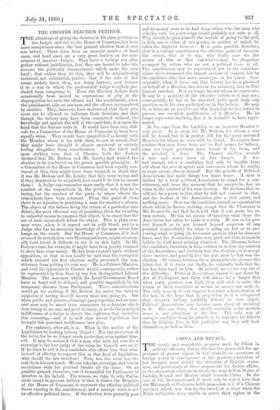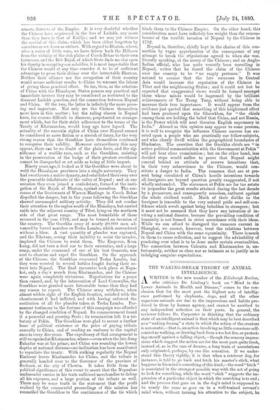CHINA AND NEPAUL.
THE steady and remarkable progress made by China in military efficiency during the last few years, and the ap- pearance of greater vigour in her councils on questions of foreign policy in consequence of the growing conviction of her strength, must attract the attention of English states- men, and particularly of those responsible for Indian affairs, to the anomalous relations in which the semi-Indian States of Ladakh, Nepaul, and Bhutan stand towards China. In the case of the first-mentioned, it need only be stated here that the Maharajah of Cashmere holds possession in it of a Chinese province which was won by the sword, at a time when the Pekin authorities were unable to assert their rights in the
remote districts of the Empire. It is very doubtful whether the Chinese have acquiesced in the loss of Ladakh, any more than they have in that of Kuldja ; and we may yet witness the revival of this claim, which has been either forgotten by ourselves or set down as extinct. With regard to Bhutan, where, after a series of little wars, we have driven back the Hillmen from the vicinity of the rich plains of Cooch Behar to their own fastnesses, and the Deb Rajah of which State finds no slur upon his dignity in accepting our subsidies, it is most improbable that the Chinese would at any time consider it to be of sufficient advantage to press their claims over the intractable Bhuteas. Neither their alliance nor the occupation of their country would secure sufficient results to China to warrant the labour of giving them practical effect. So far, then, as the relations of China with the Himalayan States possess any practical and immediate interest they may be considered as restricted to the dormant Ladakh question, and the connection between Nepaul and China. Of the two, the latter is infinitely the more press- ing and important. Not only are the Chinese themselves more keen in this matter ; but the ruling classes in Nepaul have, for reasons difficult to discover, perpetuated an arrange- ment which, but for their strict adherence to the terms of the Treaty of Khatmandoo, would long ago have lapsed. The actuality of the suzerain rights of China over Nepaul cannot be considered as mere fiction or a stretch of fancy, for the very strong reason that the Goorkhas have themselves continued to recognise their validity. However extraordinary this may appear, there can be no doubt of the plain facts, and the sig- nificance of a warlike race, such as the Goorkhas, assisting in the preservation of the badge of their greatest overthrow cannot be disregarded or set aside as being of little import.
Ninety years ago, it looked as if the Goorkhas were about to weld the Himalayan provinces into a single autocracy. They had overthrown a native dynasty, and established theirsway over the peaceable inhabitants of the valley of Nepaul ; and on one occasion they even joined a confederacy, formed at the insti- gation of the Rajah of Bhutan, against ourselves. The suc- cesses of the lieutenants of Warren Hastings in Coach Behar dispelled the danger, but in the years following the Goorkhas showed unexampled military activity. They did not confine their attention to the region south of the Himalaya, but carried raids into the adjacent country of Tibet, lying on the northern side of that great range. The most formidable of these occurred in the year 1792, and may be termed an invasion of the country. The Goorkha army of nearly 20,000 men ad- vanced by forced marches on Teshu Lumbo, which surrendered without a blow. A vast quantity of plunder was captured, and the Tibetans, seeing their inability to resist the invader, implored the Chinese to assist them. The Emperor, Keen Lung, did not turn a deaf ear to their entreaties, and a large army, under the command of one of his best Generals, was sent to chastise and expel the Goorkhas. On the approach of the Chinese, the Goorkhas evacuated Teshu Lumbo, but they were worsted in several battles fought during their re- treat into Nepaul. The final encounter took place at Naya- kot, only a day's march from Khatmandoo, and the Chinese were again completely victorious. Negotiations for a peace then ensued, and, by the intervention of Lord Cornwallis, the Goorkhas were granted more favourable terms than they had any reason to expect. The Chinese army withdrew, when almost within sight of the English frontier, satisfied with the chastisement it had inflicted, and with having enforced the restitution of all the plunder taken at Teshu Lumbo. Per- manent testimony to the fortune of this campaign was afforded by the changed condition of Nepaul. Its commencement found it a powerful and growing State ; its termination left it a tri- butary of Pekin. The Goorkhas were glad to secure a further lease of political existence at the price of paying tribute annually to China, and of sending an embassy to the capital once in every five years. The expediency of that arrangement is still recognised at Khatmandoo, where—even when the late Jung Bahadur was at his prime, and China was sounding the lowest depths of national distress—no inclination has been manifested to repudiate the treaty. With striking regularity the Nepaul Embassy leaves Khatmandoo for China, and the tribute is generally handed over to the Governor of the province of Szchuen. at the city of Chentu. It takes little from the political significance of this event to assert that the Nepaulese ambassador carries in his train sufficient merchandise to defray all his expenses, and a large portion of the tribute as well. There may be some truth in the statement that the profit realised by the commercial proceedings of this mission has reconciled the Goorkhas to the continuance of the tie which binds them to the Chinese Empire. On the other hand, this consideration must have infinitely less weight than the remem- brance of the terrible invasion of Nepaul by the Chinese in 1792.
Nepaul is, therefore, chiefly kept in the chains of this con- nection by vague apprehension of the consequence of any attempt to break the stipulations agreed to when she was, literally speaking, at the mercy of the Chinese ; and an Anglo- Indian official, who has quite recently been travelling in Nepaul, writes that he found the claim of the Chinese over the country to be " no empty pretence." It was natural to assume that the late successes in Central Asia would increase the reputation of the Chinese in Tibet and the neighbouring States ; and it could not but be expected that exaggerated views would be formed amongst those whose minds would be impressed by the brilliant achievements of Tso Tsung Tang, without being able to measure their true importance. It would appear from the evidence just quoted that something of this heightened effect had been produced upon the Ghoorkhas, for " the chiefs among them are holding the belief that China, and not Russia, is the Power which will next threaten English supremacy in India." Absurd as this opinion may appear to some persons, it is well to recognise the influence Chinese success has ex- erted upon a people who are practically our fellow-subjects, and who clearly dwell within the geographical boundaries of Hindostan. The assertion that the Goorkha chiefs are " in active political communication with the Government at Pekin" will not bear close examination ; but on the other hand, less decided steps would suffice to prove that Nepaul might conceal behind an attitude of reserve intentions that, in their very subservience to the Chinese, would con- stitute a danger to India. The rumours that are at pre- sent being circulated of China's hostile intentions towards all foreigners are beyond question greatly exaggerated, if not wholly unfounded. The statesmen at Pekin are far too astute to jeopardise the great results attained during the last decade by a premature, and consequently senseless, outburst against the whole civilised world. Much of their dislike to the foreigner is traceable to the very natural pride and self-con- fidence which revolt against being beholden to strangers ; but it must not be assumed that they have any intention of in- viting a national disaster, because the prevailing condition of humanity is not framed in strict accordance with their ideas. While we can afford to disregard the rumours current in Shanghai, we cannot, however, treat the relations between Nepaul and China with the same equanimity. There is much in them to cause reflection, and to suggest the advisability of pondering over what is to be done under certain eventualities. The connection between Calcutta and Khatmandoo is, un- fortunately, neither so close nor so intimate as to justify us in indulging sanguine expectations.



































 Previous page
Previous page